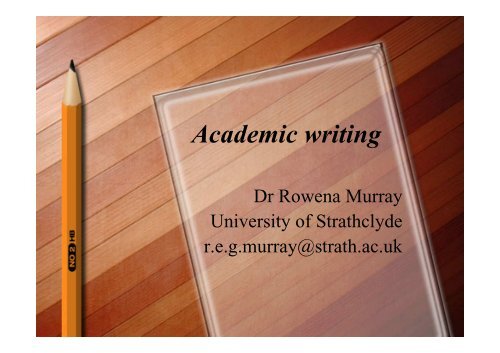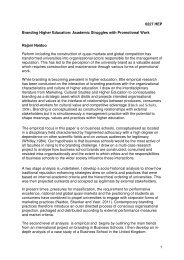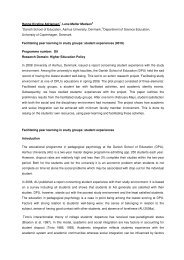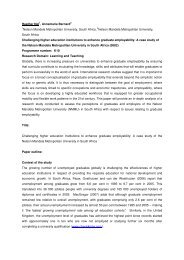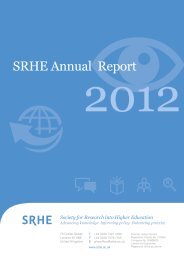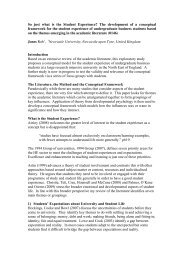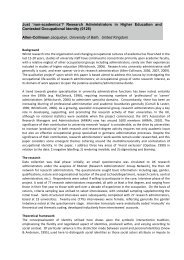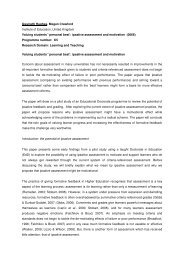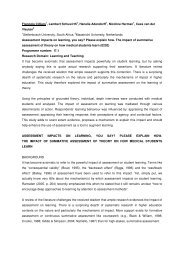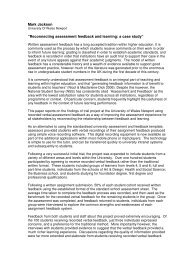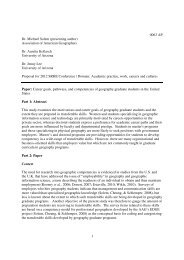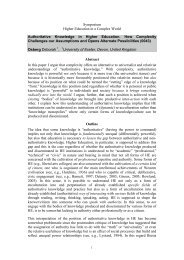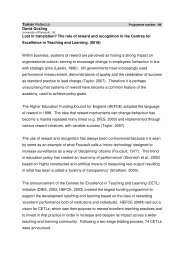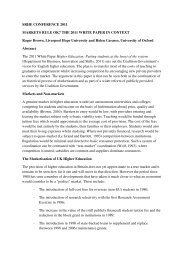Academic Writing-Dr. Rowena Murray
Academic Writing-Dr. Rowena Murray
Academic Writing-Dr. Rowena Murray
Create successful ePaper yourself
Turn your PDF publications into a flip-book with our unique Google optimized e-Paper software.
<strong>Academic</strong> writing<br />
<strong>Dr</strong> <strong>Rowena</strong> <strong>Murray</strong><br />
University of Strathclyde<br />
r.e.g.murray@strath.ac.uk
<strong>Writing</strong> to prompts<br />
What writing for your thesis have you<br />
done, and what would you like to do [in<br />
the long, medium and short term]?<br />
5 minutes’ writing<br />
In sentences<br />
Private writing -- no one will read it<br />
To be discussed in pairs/groups
Why a ‘page 98 paper’? And when?<br />
Early: to establish direction/focus<br />
Associate & dissociate with literature<br />
Build on research question/hypothesis<br />
Focus reading/thinking<br />
Manageable writing task: 325 words<br />
To develop thinking and/or for thesis?<br />
Late: to focus thinking/intro conclusions
<strong>Writing</strong> a page-98 paper<br />
My research question is … (50 words)<br />
Researchers who have looked at this subject<br />
are … (50 words)<br />
They argue that … (25 words)<br />
Debate centres on the issue of … (25 words)<br />
There is work to be done on … (25 words)<br />
My research is closest to that of X in that …<br />
(50 words)<br />
My contribution will be … (50 words)
Make your ‘contribution’ explicit<br />
‘This research shows/reveals/confirms’<br />
‘This is a contribution in the sense that<br />
…’<br />
‘This is a contribution to the extent that<br />
…’
Internalising the debate<br />
‘Some will argue that …’<br />
‘One interpretation could be …’<br />
‘However, this could be taken as<br />
…’<br />
‘This is not to say that …’<br />
‘Possible interpretations include …’
Brown’s 8 questions<br />
1. Who are intended readers? (3-5 names)<br />
2. What did you do? (50 words)<br />
3. Why did you do it? (50 words)<br />
4. What happened? (50 words)<br />
5. What do results mean in theory? (50 words)<br />
6. What do results mean in practice? (50<br />
words)<br />
7. What is the key benefit for readers (25<br />
words)<br />
8. What remains unresolved? (no word limit)
Brown’s 8 questions<br />
To draft an abstract<br />
Not just for experimental work<br />
Set word limits<br />
Using generic structure<br />
Generating text you can work on later<br />
Write abstract first, revise it as you go<br />
Construct/see the whole argument
References & readings<br />
<strong>Murray</strong>, R & Moore, S (2006) The<br />
handbook of academic writing: A fresh<br />
approach. Maidenhead: Open University<br />
Press-McGraw-Hill.
References & readings<br />
<strong>Murray</strong>, R. (2006) How to Write a Thesis,<br />
2nd edition.<br />
<strong>Murray</strong>, R. (2003) How to Survive your<br />
Viva.<br />
<strong>Murray</strong>, R. (2005) <strong>Writing</strong> for <strong>Academic</strong><br />
Journals.<br />
Maidenhead: Open University Press-<br />
McGraw-Hill.
Other readings<br />
Morss, K. & <strong>Murray</strong>, R. (2005) Teaching at<br />
University: A Guide for Postgraduates and<br />
Researchers. London: Sage.<br />
Gilbert, N. Ed. (2006) From Postgraduate to<br />
Social Scientist: A Guide to Key Skills.<br />
London: Sage.<br />
See <strong>Murray</strong>, Chapter 9: ‘<strong>Writing</strong> articles,<br />
books and presentations’ 149-170.


